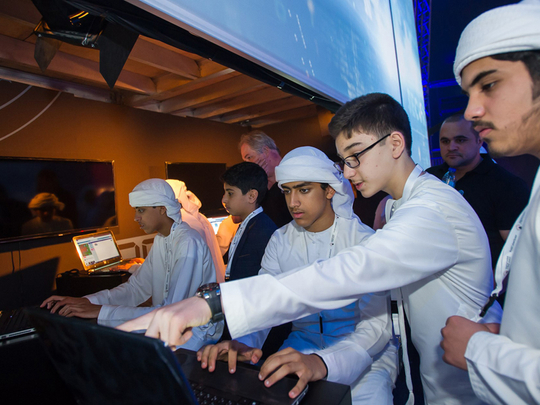
Abu Dhabi: In a bid to create awareness about cybersecurity, a nationwide competition today (May 5) saw 60 schoolchildren test their wits against one another.
The contest was organised by the National Electronic Security Authority (Nesa), a federal body created in 2012 to oversee the UAE’s infrastructure for information and communication technologies, and develop strategies and regulations for them. It was held in the capital in collaboration with the emirate of Abu Dhabi’s education sector regulator, the Abu Dhabi Education Council.
As the UAE works towards becoming a smart nation with access to top quality infrastructure, ensuring online security gains paramount importance, Saif Al Nuaimi, head of regulatory and strategic affairs at the Nesa, told Gulf News on the sidelines of the event.
“This requires an innate understanding of the vulnerabilities that can arise in network systems, and how these can be addressed. This is why we need to create platforms to spread such awareness among today’s schoolchildren, who will be the drivers of tomorrow’s economic and technological progress,” he added.
The second edition of the annual competition, titled Cyber Quest, measured the knowledge of online security among schoolchildren enrolled in Grades 6 to 12. Before the competition, participants were trained about the risks of hacking, and taught how to detect vulnerabilities in existing networks so that defences can be enhanced. A total of 560 pupils from across the UAE registered for the initial stages, and 60 of the top scorers were selected for today’s final round.
Competitors were grouped into pairs and asked to answer a series of questions regarding networking, programming languages, risks of hacking and cybersecurity. Three teams were finally selected to receive technology-related prizes.
“Through this competition, our goal is to encourage the next generation of cybersecurity experts. We hope to follow up with the winners, and look forward to providing scholarships to Emiratis who excel in the competition,” Al Nuaimi said.
“Through initiatives like Cyber Quest, we also want to stress that there are many roles that potential programmers can play in the UAE’s development process, and the building and maintenance of its critical infrastructure,” the official added.
Amir Mahdy, a Grade 12 Norwegian-Iraqi pupil, said the training provided before the competition shed a lot of light on the risks of hacking. He was part of a team that secured the second place in the contest.
“I entered the contest because I have always had a passion for programming and gaming. We were able to learn how to defend ourselves from online attacks, and it was an enriching experience,” the Sharjah-based pupil said.











